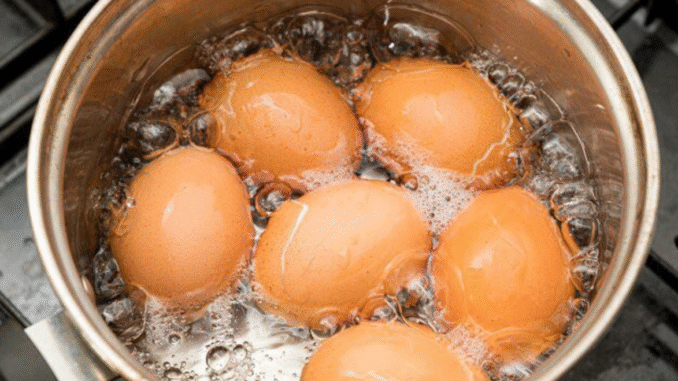
1. It’s Packed with Nutrients for Plants
When you boil eggs, some of the calcium and other minerals from the eggshells leach into the water. This nutrient-rich liquid can act as a natural fertilizer for your plants. Calcium is essential for plant cell wall development, promoting stronger stems and healthier growth. It’s particularly beneficial for plants like tomatoes, peppers, and roses, which are prone to calcium deficiencies…..CONTINUE FULL READING>>
How to Use It: Let the water cool to room temperature, then use it to water your houseplants, garden beds, or potted herbs. Avoid using it on plants that prefer acidic soil, like azaleas, as the calcium may slightly alter soil pH.
2. It’s a Natural Cleaner
How to Use It: After cooling slightly, pour the water into a dirty pot or pan and let it soak for a few minutes before scrubbing. You can also use it to wipe down countertops with a cloth, but avoid surfaces sensitive to heat or minerals, like marble.
3. It Can Soothe Skin
The water from boiling eggs contains small amounts of minerals like calcium and magnesium, which can be soothing for irritated or dry skin. While not a substitute for medical treatments, this water can be repurposed for a relaxing foot soak or to rinse your hands after a day of gardening or manual work.
How to Use It: Cool the water to a comfortable temperature, then pour it into a basin for a foot soak or use it as a gentle rinse for hands. Add a few drops of essential oils like lavender for extra relaxation, but test a small area of skin first to ensure no irritation.
4. It’s Useful for Cooking
How to Use It: Use the cooled water to cook rice, pasta, or vegetables, or as a base for soups and broths. Ensure the water is free of any additives or eggshell debris before using it in recipes.
5. It Supports Sustainable Living
How to Use It: Beyond the uses above, consider storing the cooled water in a jug for later use in gardening, cleaning, or even laundry pre-soaks for delicate fabrics.
Things to Keep in Mind
While egg-boiling water has many uses, there are a few precautions to take:
- Avoid Salted or Flavored Water: If you added salt, vinegar, or other seasonings to the water, it may not be suitable for plants or skin. Stick to plain water for these purposes.
- Cool It Down: Hot water can damage plants, skin, or surfaces, so always let it cool to room temperature before use.
- Check for Contamination: If an egg cracked during boiling, the water might contain raw egg residue, which could harbor bacteria. Discard it if you suspect contamination.
- Not a Miracle Solution: While the water contains trace nutrients, it’s not a substitute for fertilizers, medical treatments, or specialized cleaners. Use it as a supplement, not a replacement.
Final Thoughts
The next time you boil eggs, think twice before pouring that water down the drain. From nourishing your plants to cleaning your kitchen or soothing your skin, this often-overlooked resource has surprising versatility. By repurposing egg-boiling water, you’re not only making the most of your kitchen routine but also embracing a more sustainable and resourceful lifestyle. Try one of these uses and see how this simple habit can make a difference in your home and garden….CONTINUE FULL READING>>
